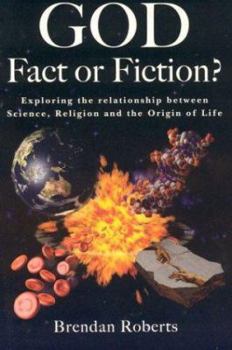God: Fact or Fiction
As we advance into the 21st Century science has exploded at a phenomenal pace. Religion, as understood to be a belief in a Creator, seems to have been left behind in the cosmic dust of science. But in... This description may be from another edition of this product.
Format:Paperback
Language:English
ISBN:0473097869
ISBN13:9780473097868
Release Date:January 2003
Publisher:Kiwi Graphix Pub
Length:280 Pages
Weight:0.87 lbs.
Dimensions:8.3" x 0.8" x 5.5"
Customer Reviews
1 rating
An Excellent Book for both Creationists and Evolutionists
Published by Thriftbooks.com User , 21 years ago
The 18th century philosopher Immanuel Kant made popular the idea that the universe was eternal, without beginning or end. Roberts, in his book, explores the relationship between science, religion, and the origin of life. He effectively deals with the challenges posed by science to classic Christian thought. He is also mindful of the fact that we are doing theology after Darwin, and so he has divided his book into two parts: science and religion. The book does not specialize in any one subject but instead has taken a very broad sweep on many topics. Part one covers aspects of cosmology, evolution, biochemistry and archaeology. Part two covers the realm of religion in its relationship to epistemology, ontology, faith and reason, theodicy, philosophy, history, and Sacred Scripture. Roberts is fortunate that there is an emerging science that supports many of the things that he and Christian theism have long espoused. A wealth of scientific evidence now shows that the universe was created out of nothing and that the universe was designed to support life and human beings. Roberts opens his first chapter with the birth of the universe, in what scientists call 'The Big Bang'. This theory suggests three things: (i) The universe had a beginning (ii) The universe came from nothing (iii) The universe is finite. Most scientists now support this theory. One such scientist is Robert Jastrow, an astrophysicist, who, when citing the implications of this theory, declared that, 'for the scientist who has lived by his faith in the power of reason, the story endslike a bad dream. He has scaled the mountains of ignorance; he is about toconquer the highest peak; as he pulls himself over the final rock, he is greeted by a band of theologians who have been sitting there for centuries' (page 57). In fact, Roberts quotes copiously with purpose from specialists. Furthermore, at the end of each chapter is a bibliography of the sources he quotes. He also covers the subject of evolution, both micro and macro. In an excellent review Roberts rejects macroevolution but wisely remains open on this issue. Roberts has written this book for the thinking non-Christian. His book is comparable to the apologetic works of Dr Steve Kumar, in that it provides an excellent resource in defense of theism. Where science has often been used to demystify the world of any transcendent meaning, Roberts attempts to restore wonder and delight to our origins and to the source of those origins. Furthermore, this book replaces the shallowness of scientific reductionismand refutes the nihilistic philosophy of atheistic materialism. In short it affirms the Judeo-Christian values of life, purpose and meaning. Albert Einstein said 'religion without science is blind, and science without religion is lame'. In using both Sacred Scripture in tandem with the Book of Nature, Roberts has skillfully brought together key insights to show how science and religion interrelate and contribute to each other in help





